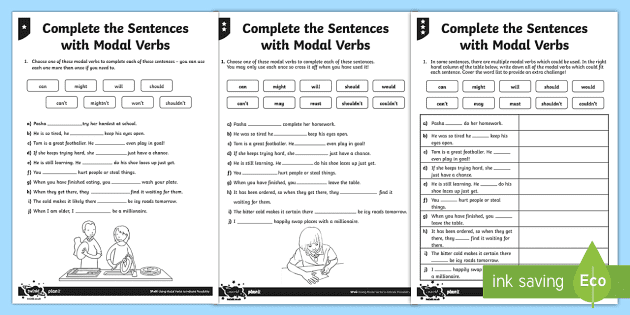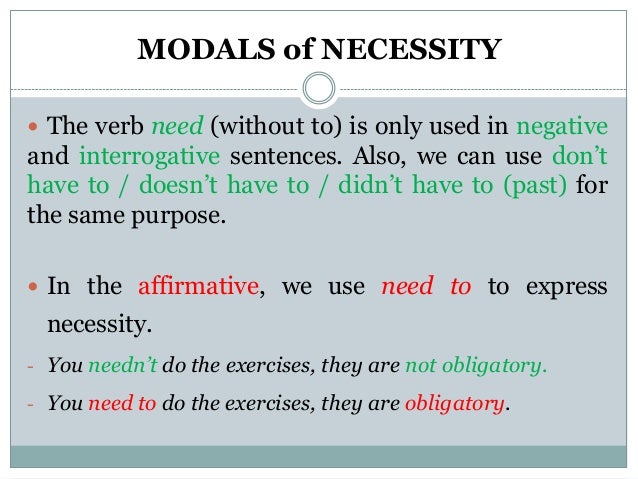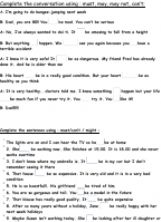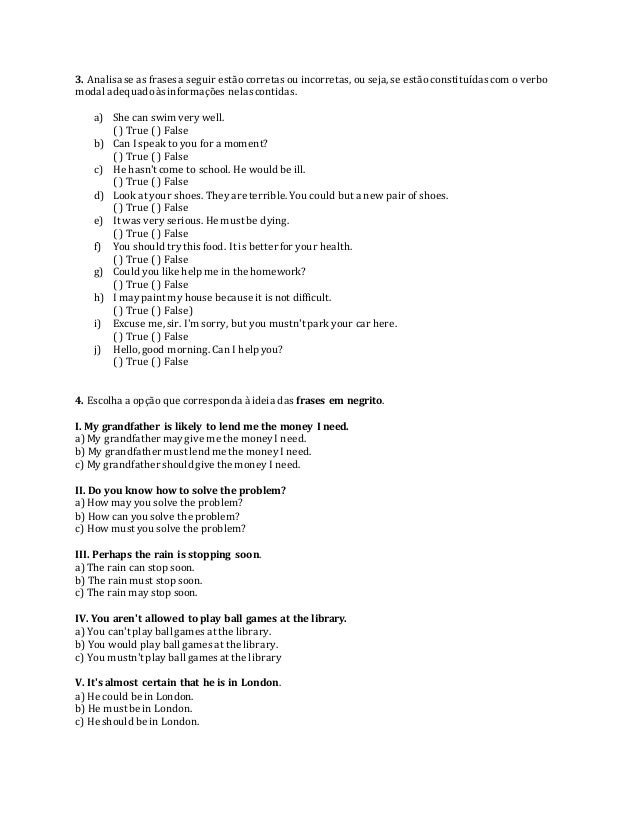Some of the worksheets below are Modals Worksheets With Answers, definition of modal verbs, common modal verbs and their particularities, modal verbs structure and use with tons of interesting writing exercises with answers.
- Modal Verbs Exercises May Could Can Would
- Modal Verbs Exercises
- Modal Verbs Exercises Agenda Web
- Modal Verbs Exercises For Kids
- Modal Verbs Exercises Multiple Choice Pdf
Once you find your worksheet(s), you can either click on the pop-out icon or download button to print or download your desired worksheet(s). Please note that you can also find the download button below each document.
Also See: Modals Verbs. Use the given verbs in either active or passive form with the most suitable modal. The entire valley - (see) from their mountain home. He is wearing a gold ring on his fourth finger. He - (marry). According to our teacher, all of our compositions - (write) in ink. Exercises First, in the exercise on the left, choose the correct modal verb in the present tense, in order to construct a text that makes sense. Then, replace the modal verb in the sentences on the right with the correct alternative form in the past tense.
Categories of modal verbs, namely single concept modal , double concept modals, modals in the past, …
Modal Verbs Exercises May Could Can Would
Open in new tabModals : Uses of Modals with exercises like modals are used to ask permission, make a request, give advice or suggestion, …
Grammar worksheet Modals of probability : Exercises with answers.
Grammar modal verbs : Questions like Fill in the gaps with a suitable modal verb and write its function.
Definition of Modal verbs, common modal verbs and their particularities, writing exercises, …
Modal verbs Exercises : Interesting exercises like fill in the blanks using MUST, MUSTN’T, DON’T HAVE TO, SHOULD, SHOULDN’T, MIGHT, CAN,CAN’T .
Modal Verbs for Expressing Obligation : 14 fun exercises with answers at the end of the page.
Modal Auxiliary Verbs : Examples of some modal auxiliary words including shall, will, may, might with exercises like underline the modals in the following sentences, …
Mix Modals Exercises : Modals of ability, modals of advise, necessity and obligation, …
 Open in new tab
Open in new tab Using Modal Auxiliary Verbs : Common meanings of modal auxiliary verbs, modals in conditional statements, …
 Open in new tab
Open in new tab 15 Modals Worksheets With Answers.
If you found these worksheets useful, please check out Common Nouns Worksheets for Grade 2 to Grade 5 | Free Subject Verb Agreement Worksheets | Adjective or Adverb Exercise Worksheets | Conjunctive Adverbs Worksheets | Adverbs of Time Place Manner and Frequency Worksheets | English Grammar Sentences Worksheets | Free Capitalization Worksheets | Learning English Worksheets for Adults | Compound Subjects Worksheets
What is a modal verb?
The modal verbs in English grammar are can, could, may, might, must, need not, shall/will, should/ought to. They express things like ability, permission, possibility, obligation etc. Modal verbs only have one form. They do not take -s in the simple present and they do not have a past simple or past participle form. However, some modal verbs have alternative forms that allow us to express the same ideas in different tenses.
Learn about the usage of modal verbs and their alternative forms in English grammar with Lingolia’s online lesson. Then put your knowledge to the test in the interactive exercises.
Example
Max’s father is a mechanic. He might retire soon, so he thinks Max should work in the garage more often.

Max can already change tyres, but he has to learn a lot more about cars.
Max must do what he is told and must not touch any dangerous equipment.
Conjugation of English Modal Verbs
There are a few points to consider when using modal verbs in a sentence:
- Modal verbs are generally only used in the present tense in English but we don’t add an -s in the third person singular.
- Example:
- He must do what he is told.
(not:He musts …)
Modal verbs do not take an auxiliary verb in negative sentences and questions.
- Example:
- Max need not worry about his future.
Max must not touch any dangerous equipment.
Can Max change a tyre?
- We always use modal verbs with a main verb (except for short answers and question tags). The main verb is used in the infinitive without to.
- Example:
- Max can change tyres.
(not:Max can to change tyres.)
Usage
We use modal verbs to express ability, to give advice, to ask for and give permission, to express obligation, to express possibility, to deduce and to make predicitions.
Can/Could for Ability
We use can in simple present.
- Example:
- Max can already change a tyre.

We can use the alternative form to be able to in all tenses (present, past, perfect, progressive and future).
- Example:
- In two years time, Max will be able to do everything in the garage.
We use could or the alternative form was/were able to in simple past.
- We use could for general ability and with the verbs feel, hear, see, smell, taste, remember and understand.
- Example:
- Max’s father could do everything in the garage.
Max’s father couldremember changing his first tyre.
- We use was/were able to when we talk about something specific in the past.
- Example:
- Was Max able to change the tyre yesterday?
To Note
There is no difference between the negative forms couldn’t and wasn’t/weren’t able to.
- Example:
- Max’s father couldn’t work in the garage alone.
Max’s father wasn’t able to work in the garage alone.
Should/Ought to for Advice
We use should/ought to to give advice, make suggestions or say what is a good idea.
- Example:
- Max should/ought to work more often in the garage.
To make suggestions about something that has already happened we use should/ought to + have + past participle.
- Example:
- Max shouldn’t/ought not to have played computer games all day.
Can/could/may/might for Permission
| modal verb | alternative form |
|---|---|
| can/could/may/might | be allowed to |
We use can/could/may/might to ask permission in simple present. Could is more polite than can, and may/might is more polite than could.
We usually only use may in questions with I and we.
We only use can or may, but not could, to give permission.
- Example:
- Max, you can/may change this tyre.
Modal Verbs Exercises
We use could in conditional clauses and in the simple past.
- Example:
- Max could change the tyre if he wanted to.
Max could/was allowed to leave early yesterday.
We can use be allowed to in all tenses.
- Example:
- Max will be allowed to use the dangerous equipment soon.
Must/need not/should for Obligation
| modal verb | alternative form |
|---|---|
| must | have to |
| mustn’t | be not allowed to |
| need not | don’t have to |
| should/ought to | be supposed to/be expected to |
We use must to say what is necessary and give orders or advice in a strong way. With must, the obligation is usually imposed by the speaker.
- Example:
- His father says, “You must do what you are told.”
We use have to when the obligation is general (e.g. a rule or law), or we are expressing past or future obligation.
- Example:
- Max is only 12 so he has to go to school.
Max’s father had to go to school too.
We use mustn’t/be not allowed to to say what is not allowed or forbidden.
- Example:
- Max mustn’t/isn’t allowed to touch any dangerous equiptment.
We can use should/be expected to like must but it is weaker.

- Example:
- Max should/is expected to study hard.
We use need not/don’t have to when there is no obligation.
- Example:
- Max need not/doesn’t have to worry about his future.
May/might for Possibility
We use may/might to express possibilty in the future. There is no difference in meaning between may and might. We don’t usually use contractions with may not and might not.
- Example:
- Max’s father might retire soon.
Max may not take over his father’s garage.
May/can’t/must/will/shall for Deduction
- We use may/might when we think something is perhaps true, but we are not 100% sure.
- Example:
- Max may/might not want to work in the garage forever.
- Example:
- Max’s father may/might/could retire soon, he is almost 60.
- Example:
- Max’s grandfather may/mighthave wanted to retire when he was 50.
- We use can’t to express something we are sure is untrue or impossible in the present.
- Example:
- Max can’t be retired, he’s 12 years old. (but not:
Max mustn’t be retired.)
- We use must to express something we are 100% sure is true in the present.
- Example:
- Max’s grandfather must be retired, he’s 90 years old. (but not:
Max’s grandfather can be retired.)
- Example:
- Max’s father musthave worked very hard.
- We use will (not)/shall (not) when we make a predicition about the future, or when we are sure about something in the future.
- Example:
- The car won’t/shan’t be ready tomorrow.
- Max will/shall be a wonderful mechanic.
Offers/Requests
We can often choose between two modal verbs with similar meanings when we ask questions or make requests. One form is more polite than the other.
| Normal Form | Polite Form | Example |
|---|---|---|
| can (ability) | could | Can you repair this flat tyre? Could you repair this flat tyre? |
| can (permission) | may/might | Can we come in? May/might we come in? |
| shall* | should | Shall he pick the car up tomorrow? Should he pick the car up tomorrow? |
| will* | would | Will the car be ready tomorrow? Would the car be ready tomorrow? |
*Will/Shall
We use will to make requests/ask somebody to do something. When we want to make a suggestion using the interrogative form in the 1st person (I, we), we use shall.
- Example:
- Max, will you change that tyre?
- Change the tyre, will you?
- Shall I change that tyre?
Learn more about shall.
Modal Verbs Exercises Agenda Web
Alternative Forms
If we want to indicate a situation in the past, we have to use the alternative forms instead of the regular modal verbs. The list below provides an overview of modal verbs and their alternative forms, along with examples.
Modal Verbs Exercises For Kids
Example
Modal Verbs Exercises Multiple Choice Pdf
Max’s father took over the garage from his father. He did not have to worry about his future either. Max’s father also had to learn a lot and had to do what he was told. He was not allowed to touch dangerous equipment. He was expected to work in the garage often. However, Max’s father was not as talented as Max and was not able to change tyres until he was 15 years old.
List - Modal Verbs and Alternative Forms
| modal verb | alternative form | example sentence |
|---|---|---|
| must | to have to | Max must do what he is told. His father also had to do what he was told. |
| must not | not to be allowed to | Max must not touch anything dangerous. His father was not allowed to touch anything dangerous. |
| can (ability) | to be able to/ could* | Max can already change tyres. His father was not able to/couldn’t change tyres. |
| can (permission) | to be allowed to/ could* | Max can help in the garage at the age of 12. Max’s father was allowed to help at the age of 13. |
| need not | not to have to | Max need not worry about his future. Max’s father did not have to worry about his future either. |
| should/ought to | to be supposed to/to be expected to/to be to | Max should work in the garage more often. Max’s father also was supposed to/was expected to/was to work in the garage often. |
Of course, we can also use the alternative forms (except for could) in other tenses.
- Example:
- Max can change tyres. = Max is able to change tyres.
* We use could and was/were able for the past of can. We use could for general ability and with the verbs feel, hear, see, smell, taste, remember and understand. We use was/were able to when we talk about something specific in the past. The negative couldn’t can be used in all three cases.
- Example:
- Max’s father could do everything in the garage.
Max’s father couldremember changing his first tyre.
Was Max able to change the tyre yesterday?
Max’s father couldn’t work in the garage alone.